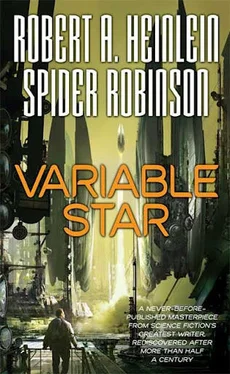Talking about dance is as silly as dancing about architecture. I don’t know how to convey exactly how we danced that night, or what was so remarkable about it. I can barely manage to believe we did it. Just let it stand that we deserved the applause we received when the music finally ended and we went into our closing clinch. It was probably the first time since I’d come to Terra that I didn’t feel heavy and weak and fragile. I felt strong… graceful… manly….
“After dancing like that, Stinky, a couple really ought to get married,” Jinny said about two hundred millimeters below my ear.
I felt fourteen. “Damn it, Jinny—” I said, and pulled away from her. I reached down for her hands, trying to make it into a dance move, but she eluded me. Instead she curtsied, blew me a kiss, turned on her heel, and left at high speed, to spirited applause.
It increased when I ran after her.
Jinny was 178 centimeters tall, not especially tall for a Terran, and I was a Ganymedean beanpole two full meters high, so her legs were considerably shorter than mine. But they were also adapted from birth to a one-gee field—to sports in a one-gee field. I didn’t catch up with her until we’d reached the parking lot, and then only because she decided to let me.
So we’d each had time to work on our lines.
Ginny went with, “Joel Johnston, if you don’t want to marry me—”
“Jinny, you know perfectly well I’m going to marry you—”
“In five more frimpin’ years! My God, Stinky, I’ll be an old, old woman by then—”
“Skinny, you’ll never be an old woman,” I said, and that shut her up for a second. Every so often a good one comes to me like that. Not often enough. “Look, don’t be like this. I can’t marry you right now. You know I can’t.”
“I don’t know anything of the sort. I know you won’t . But I see nothing preventing you. You don’t even have to worry about parental consent.”
“What does that have to do with it? Neither do you. And we wouldn’t let parental disapproval stand in our way if we did want to get married.”
“You see? I was right—you don’t want to!”
I was becoming alarmed. I had always thought of Jinny as unusually rational, for a girl. Could this be one of those hormonal storms I had read about? I hoped not—all authorities seemed to agree the only thing a man could do in such weather was lash himself to the mast and pray. I made a last stubborn attempt to pour logic on the troubled waters. “Jinny, please—be reasonable! I am not going to let you marry a dole bludger. Not even if he’s me.”
“But—”
“I intend to be a composer. You know that. That means it’s going to take me at least a few years to even start to get established. You knew that when we started dating. If, I say ‘if,’ all those bullocks I sacrificed to Zeus pay off and I actually win a Kallikanzaros Scholarship, it will be my great privilege to spend the next four years living on dishrag soup and scraped fridge, too poor to support a cat. If, and I say ‘if,’ I am as smart as I think I am, and luckier than I usually am, I’ll come out the other end with credentials that might , in only another year or two, leave me in a position to offer you something more than half of a motel cubicle. Meanwhile, you have your own scholarships and your law degree to worry about, so that once my music starts making serious money, nobody will weasel it away from us.”
“Stinky, do you think I care about money ?” She said that last word as if it were a synonym for stale excrement.
I sighed. Definitely a hormonal storm. “Reboot and start over. What is the purpose of getting married?”
“What a romantic question!” She turned away and quested for her car. I didn’t move.
“Quit dodging, I’m serious. Why don’t we just live together if we want to be romantic? What is marriage for ?”
The car told her she was heading the wrong way; she reversed direction and came back past me toward its voice and pulsing beacon. “Babies, obviously.”
I followed her. “Bingo. Marriage is for making jolly babies, raising them up into successful predators, and then admiring them until they’re old enough to reward you with grandchildren to spoil.”
She’d acquired the car by now; she safed and unlocked it. “My baby-making equipment is at its peak right now ,” she said, and got in the car. “It’s going to start declining any minute.” She closed, but did not slam, the door.
I got in my side and strapped in. “And the decline will take decades to become significant,” I pointed out logically. “Your baby-making gear may be at its hypothetical optimum efficiency today—but my baby- raising equipment isn’t even operational yet.”
“So what?”
“Jinny, are you seriously proposing that we raise a child as extraordinary and gifted as ours on credit ?” We both shared a most uncommon aversion to being in debt. Orphans spend too much of their childhood in debt to others—debt that cannot be repaid.
“ Nobody seems to be seriously proposing around here,” she said bitterly.
Hormonal hurricane, maybe. A long time ago they used to name all hurricanes after women. On Ganymede, we still named all groundquakes after them. “Look—”
She interrupted, “Silver: my home, no hurry.” The car said, “Yes, Jinny,” and came alive, preparing for takeoff.
I wondered as always why she’d named her car that—if you were going to pick an element, I thought, why not hydrogen? I failed to notice the slight change in address protocol. Despite our low priority, we didn’t have to wait long, since nobody else had left the prom yet and the system was between rush hours; Silver rose nearly at once and entered the system with minimal huhu. That early in the evening, most of the traffic was still in the other direction, into Greater Vancouver. Once our speed steadied, Jinny opaqued the windows, swiveled her seat to face me, and folded her arms. I’m sure it was quite coincidental that this drew my attention to the area immediately above them. I believe in the Tooth Fairy, too. “Pardon me for interrupting you,” she said.
She looked awfully good. Her prom dress was more of a spell than a garment. The soft warm interior lighting was very good to her. Of course, it was her car.
That was the hell of it. I wanted to marry her at least as much as she wanted to marry me. Just looking at her made my breath catch in my throat. I wished with all my heart, and not for the first time, that we lived back when unmarried people could live together openly. They said a stable society was impossible, back then. But even if they were right, what’s so great about a stable society?
My pop used to say, “Joel, never pass up a chance to shut up.” Well, some men learn by listening, some read, some observe and analyze—and some of us just have to pee on the electric fence. “Jinny, you know I’m a backward colonial when it comes to debt.”
“And you know I feel the same way about it that you do!”
I blinked. “That’s true. We’ve talked about it. I don’t care what anybody says; becoming the indentured servant of something as compassionate and merciful as a bank or credit union simply isn’t rational.”
“Absolutely.”
I spread my hands. “What am I missing? Raising a child takes money—packets and crates of the stuff. I haven’t got it. I can’t earn it. I won’t borrow it. And I’m too chicken to steal it.”
She broke eye contact. “Those aren’t the only ways to get it,” she muttered. Silver gave its vector-change warning peep , slowed slightly, and banked left to follow the Second Narrows Bridge across Burrard Inlet.
Читать дальше










